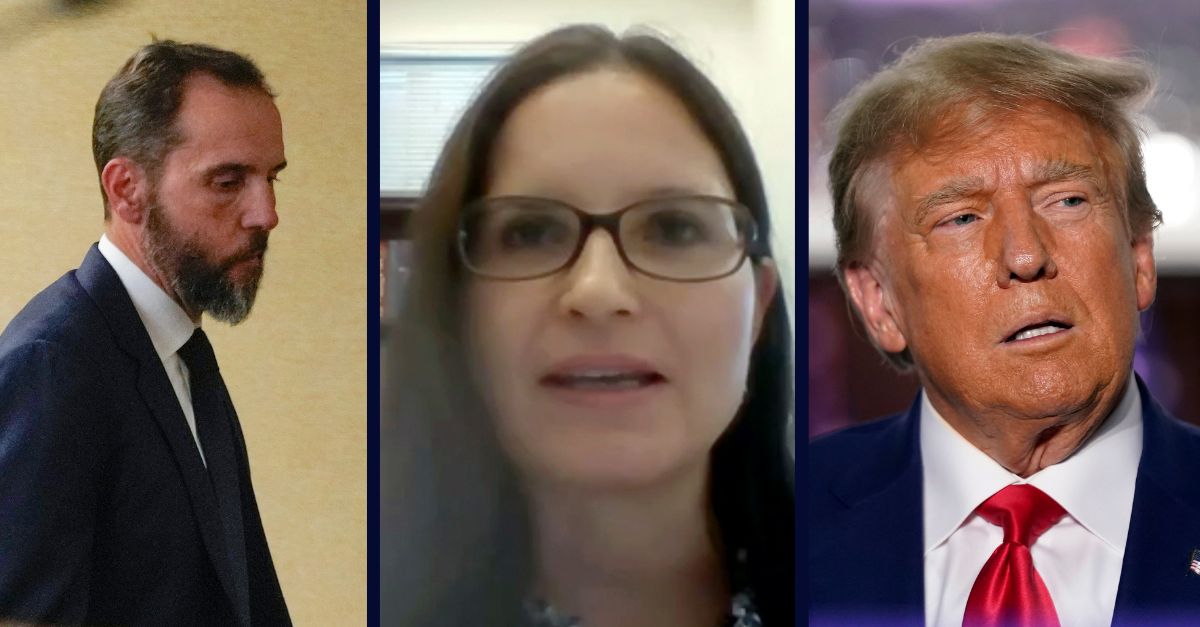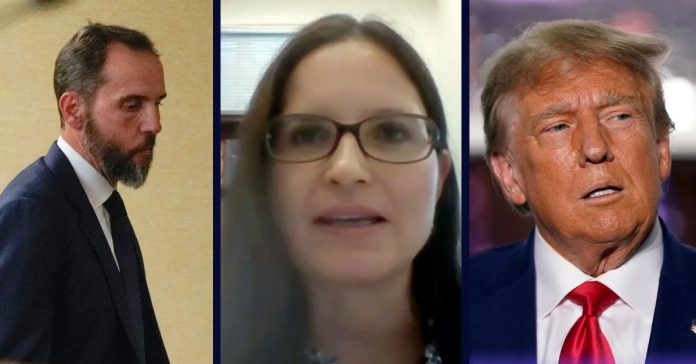
Left to right: Special counsel Jack Smith arrives to speak about an indictment of former President Donald Trump, Aug. 2023. (AP Photo/Jacquelyn Martin)/U.S. District Judge Aileen Cannon during remote Senate Judiciary Committee nomination hearing. (U.S. Senate via AP)/Former President Donald Trump speaks at Trump National Golf Club in Bedminster, N.J. June 2023. (AP Photo/Andrew Harnik, File)
This week, as Donald Trump‘s legal sagas plod ahead — and Super Tuesday fast approaches on March 5 — both he and special counsel Jack Smith are on tenterhooks as they await significant rulings that could shape the fate of Trump’s many criminal indictments. But anticipation — and tension — reached particularly new heights in Florida where U.S. District Judge Aileen Cannon and Smith went head-to-head.
Law&Crime takes a look at those developments and others in Trump’s cases in Florida, Georgia, Washington, D.C., and New York.
FLORIDA
CRIMINAL
Things started out curiously at the federal courthouse in West Palm Beach when Trump’s attorneys asked to file a motion to dismiss all charges in one time-saving brief that would hit every argument, namely: his claim to “absolute immunity” from criminal prosecution, allegations of “vindictive” prosecution, “constitutional vagueness” in the charges, Smith’s “improper” appointment and his contention that any retention of top secret and classified documents was proper under terms of the Presidential Records Act.
Cannon denied the request and instead, ordered motions to be filed piecemeal, citing concerns over “clarity” in the record. Notably, this decision came mere days after Smith entered a motion to reconsider where he called out her “clear error” in setting lax restrictions around sensitive filings in discovery.
Chiefly, Smith expressed concern about the intimidation of witnesses if their names are unsealed on the record as Cannon has decided. For now, the parties are still tangling over that very question so the judge has opted to keep them under wraps.
Trump ended up filing seven motions late on Thursday; four public and three under seal. Additional motions are expected and he filed a motion Friday seeking hearings on nearly a dozen distinct issues.
OF NOTE: Motions to reconsider are quite rare. But Cannon has twice been overturned by a higher court when Smith has pushed back. She must either uphold her ruling or acknowledge the error Smith says she made. If she stays the course, then Smith could appeal and seek a reversal on the ruling. The window to request her dismissal or recusal from the case altogether would fly open at this point, too.
WASHINGTON, D.C.
CRIMINAL
Things are quiet in the federal venue where Trump faces charges that he criminally conspired to overturn the results of the 2020 election and defrauded the United States in the process. Trump’s motions to dismiss the case — and the subsequent appeals that followed — squashed the March 4 trial date set by U.S. District Judge Tanya Chutkan.
Trump filed an application with the Supreme Court to stay the trial two weeks ago so it is the high court’s move next. The wait may not be a matter of mere mulling of the question. It can also take time for justices to write opinions — especially if they deny the stay and choose to explain their dissents or concurrences. But that’s not the only possibility, as longtime prosecutor Steve Vladeck opined Friday on X.com.
OF NOTE: If the Supreme Court declines to hear the question at all, then the ball would go right back to Chutkan to rule on the immunity question. With time factored in for Trump’s pretrial preparations, that could mean the trial in Washington, D.C., gets underway in the summer. That may be wishful thinking as there is also a chance the court could agree to weigh the case but wait until the end of its term to issue a decision. The term ends on Oct. 7 — less than a month before the general election on Nov. 5.
The Supreme Court did, however, agree to set an important hearing on April 16. The justices will hear Fischer v. United States. The question has the potential to upend Trump’s obstruction charge in his case in Washington, D.C., as well as hundreds of other rioters.
CONSTITUTIONAL
The Supreme Court has still not issued a ruling on whether Donald Trump is disqualified from appearing on the presidential primary ballot in Colorado under Section III of the Fourteenth Amendment, also known as the Constitution’s insurrection clause.
Things looked dubious for the petitioners who sued to remove Trump during oral arguments on Feb. 8.
CIVIL
Trump missed a deadline at the U.S. Supreme Court to fight off civil immunity claims stemming from Jan. 6 lawsuits.
NEW YORK
CIVIL
New York State Supreme Court Justice Arthur Engoron slapped away Trump’s attempt to stay the order issued last week directing him to pay $354 million — plus interest — in penalties for lying about Trump Organization finances for years.
Trump offered to make a “counter-judgment.”
But Engoron did not bite.
“You have failed to explain, much less justify, any basis for a stay. I am confident that the Appellate Division will protect your appellate rights,” he wrote in an email to Trump’s defense attorney.
New York State Attorney General Letita James is ready to start collecting what is owed to state taxpayers tout-suite. In an interview with this past week, she said she eyeball’s Trump’s building at 40 Wall Street “each and every day.”
CRIMINAL
For now, Trump’s election interference and hush-money case is still on course for March 25. Trump faces 34 charges brought by Manhattan District Attorney Alvin Bragg.
Bragg has emphasized that the trial is about more than hush-money payments Trump is accused of giving to porn star Stormy Daniels. He has argued that this fraud misled voters about their candidate in the run-up to the 2016 election. Michael Cohen, once Trump’s fixer, is expected to testify.
GEORGIA
CRIMINAL
In Fulton County on Friday, where Trump and more than a dozen co-defendants face racketeering charges, Judge Scott McAfee scheduled closing arguments for District Attorney Fani Willis’ disqualification hearing for March 1.
Willis and special prosecutor Nathan Wade were under intense scrutiny for two days last week as allegations emerged from Trump’s co-defendants that the DA was having an inappropriate romantic relationship with Wade.
If Willis is disqualified, the Georgia trial would likely not go to trial until after the general election in November.
Have a tip we should know? [email protected]

